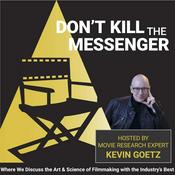Send Kevin a Text Message
In this episode of Don't Kill the Messenger, host Kevin Goetz welcomes Jon M. Chu on the opening day of Wicked: For Good, a film that generated exciting audience reactions during test screenings. From his family's Chinese restaurant in Silicon Valley to directing one of the most anticipated musicals in Hollywood history, Jon's journey reveals how generosity, gratitude, and respect for storytelling shape extraordinary movies.
The Most Explosive Audience Reaction Ever (00:29): Kevin describes how Wicked test screenings produced reactions unlike anything he'd experienced.
The Risk of Adapting a Broadway Phenomenon (03:57):After 20 years of failed attempts by other directors, Jon wasn't sure he should take on Wicked. But Elphaba's lyrics, "something has changed within me," convinced him to take on the project.
The House of Stories: A Silicon Valley Restaurant (18:40):Jon's family restaurant, Chef Chu's (now 56 years strong), became "a house of stories,” an intersection where customers shared beginnings and endings while Silicon Valley engineers dreamed of the future.
The Spielberg Meeting and the Costume Chest Pitch (29:52): After creating a musical short, Steven Spielberg saw it and invited Jon to Dreamworks. Jon describes the hilarious pitch meeting that included a trunk full of costumes.
Finding Cynthia and Ariana: No Chemistry Read Required (41:15):When casting Wicked, Jon was guided by the saying, "It's about the girls, stupid." Cynthia Erivo brought vulnerability and dignity to Elphaba, while Ariana Grande proved to be the perfect choice.
The Fiyero Tree Nest: What Cinema Is All About (46:10): Jon breaks down every intentional choice in the intimate scene between Elphaba and Fiyero.
What's Next: From Dr. Seuss to Britney Spears (52:59): Jon's upcoming slate includes Oh, The Places You'll Go!,Joseph and the Amazing Technicolor Dreamcoat, the Britney Spears biopic based on The Woman in Me, and a live-action Hot Wheels movie.
The Sacred Space of Movie Theaters (56:11): Jon delivers a passionate defense of theatrical exhibition, "You have to put your phone down, sit in the dark with strangers and live through someone else's eyes for two hours.”
Jon Chu shows how great art can come from a foundation of gratitude, generosity received and given forward, and unwavering commitment to stories that challenge us to become who we want to be.
Host: Kevin Goetz
Guest: Jon Chu
Producer: Kari Campano
Writers: Kevin Goetz, Darlene Hayman, and Kari Campano
Audio Engineer: Gary Forbes (DG Entertainment)
For more information about Jon M. Chu:
Wikipedia: https://en.wikipedia.org/wiki/Jon_M._Chu
IMDB: https://www.imdb.com/name/nm0160840/
Instagram:
For more information about Kevin Goetz:
- Website: www.KevinGoetz360.com
- Audienceology Book: https://www.simonandschuster.com/books/Audience-ology/Kevin-Goetz/9781982186678
- How to Score in Hollywood: https://www.amazon.com/How-Score-Hollywood-Secrets-Business/dp/198218986X/
- Facebook, X, Instagram, TikTok, YouTube, Substack: @KevinGoetz360
- LinkedIn @Kevin Goetz
- Screen Engine/ASI Website: www.ScreenEngineASI.com



